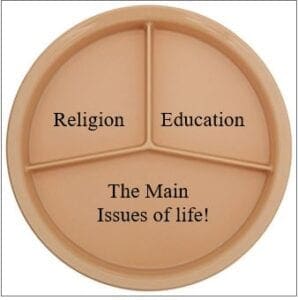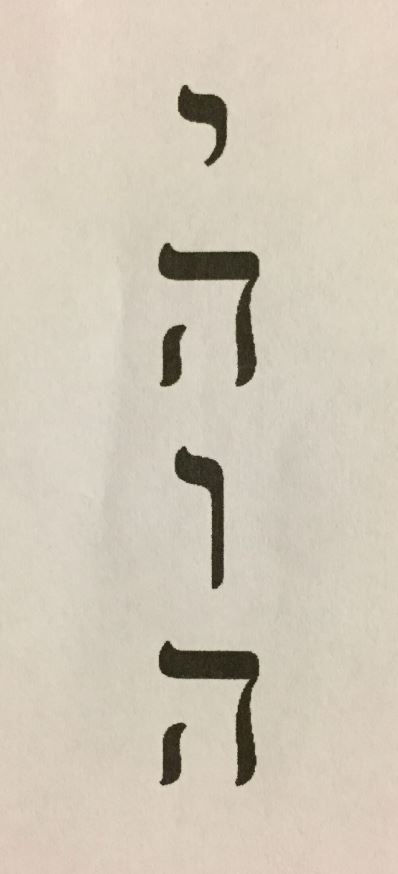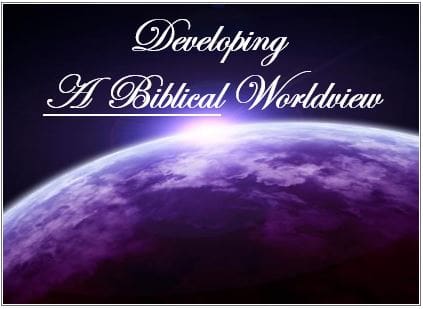Old Testament Reading: Exodus 3:1-15 – New Testament Reading: 2 Corinthians 1:1-4
Promise or Paganism
Developing a Biblical Worldview
“The Creator’s Name”
Exodus 3:1-15
Wayne J. Edwards, Pastor
By every statistical measure, the evangelical church in the West is in great danger.
- Not only are we becoming increasingly ineffective in our witness to unbelievers, but we are also losing our children and youth to the intellectual elites whose worldview denies the existence of God.
- If our children are to believe the truth about the God of our salvation, they must first believe the truth that He is also the God of all Creation.
- Today’s children need to know they are a treasured blessing from a loving Heavenly Father, who has made every provision for them to have a personal relationship with Him.
- The biblical role of a parent is to be a good steward of the children God places in their care.
- Parents have the responsibility to care for the spiritual, mental, emotional, and physical well-being of their children and to guide them to establish a biblical worldview.
While there are many different expressions, there are only two major worldviews:
- Rejects the existence of an all-powerful, all-knowing Creator God.
- Believes the world in which we live is the result of a spontaneous combustion of materials, that, over time and by random selection, these various materials evolved into the sun, moon, stars, and earth we have today, along with the various animals and humans.
- Believes this life is all there is; there is no life after death.
- The Apostle Paul described it n Romans 1:18-32.
- Believes an all-knowing, all-powerful Creator God exists.
- Believes God created the heavens and the universe as the evidence of His almighty power.
- Believes God created all living creatures, including mankind, according to His purposes.
- Believes God redeemed lost man from eternal destruction to prove His desire to be personally involved in our lives.
- Believes the Bible is the divinely inspired Word of God, truth with no mixture of error in its content or intent.
- Believes Jesus Christ lived a sinless life and sacrificed His life for our sins.
- Believes salvation is by grace alone through one’s faith alone and in Christ alone.
- Therefore, a biblical worldview is to live according to the principles and the promises of God’s Word. However:
- Only 4% of all Americans hold a biblical worldview.
- Only 19% of those who claim to be evangelical Christians agree with a biblical worldview.
- 43% of Millennials – those 25-40 years of age say they do not know if God exists, and they don’t care.
“The Millennial generation seems to be committed to living without God, without the Bible, and without Christian churches as the foundation for their way of life. It is hard to imagine a louder, clearer, and more direct challenge
to the future of the Christian Faith in the United States.” – George Barna
“Let no one take you captive through philosophy and empty deception,
according to the tradition of men, according to the elementary principles
of the world, rather than according to Christ, for in Him all the fullness of
Deity dwells in bodily form!” Colossians 2:8-9
- The Christian life is not like a three-partitioned plate:

- If we are able to stand against the tsunami of secularism that is flooding our culture, we must develop a worldview centered on the God of the Bible, and then manifest it in every aspect of our daily lives.
- In John 17:3, in His prayer to God the Father, Jesus made this astounding statement and very challenging revelation:
- “And this is life eternal, that they might know thee, the only true God, and Jesus Christ, whom thou hast sent!”
- Jesus defined eternal life as knowing God as the only true God, and Jesus Christ, whom God sent to be our Savior.
- Therefore, the place to begin in our pursuit of the knowledge of God is our understanding of His Name, for the depth of our concept of God will determine the depth of our biblical worldview.
- We refer to God as “God” because He is our deity – He is our God – that is His position over our lives.
- But our Creator God gave Himself a name, and many other names, as demonstrations of His character.
- Therefore, if we are to develop that personal, intimate relationship with this Holy God, we must study the meaning behind each of His names.
1. The Proper Name of God – Exodus 3:1-15 – Vs 14-15 “God said to Moses, I AM THAT I AM…this is my name forever!”
Moses was the first man on earth to hear the proper name of our Creator God!
- When Moses asked God: “Whom shall I say sent me?” God answered: “I AM THAT I AM”, which means: the “Self-Existent One”, “the Eternal One”, “the One who was and is and forever shall be”.
- “I AM THAT I AM” reveals the fullness of God’s character and the eternality of His being, therefore, that name tells us everything that can be known about God.
- The four Hebrew letters that have been transliterated into our English letters that refer to that name are: YHWH:
- Yod – which rhymes with “rode”
- He – which rhymes with “say”
- Vav – which rhymes with “ava”
- He – which rhymes with “say”
- Adding the vowels for proper pronunciation and you have the name: YAHWEH; the English translation of “I AM THAT I AM”
- In John 14:6, Jesus said: “I am the way, the truth and the life!” “I Am” meant He was the only way, the only truth, and the only way to have everlasting life!
Moses was also the first man to see the name of God in written form.
- The four Hebrew letters of God’s Proper Name are Yod, He, Vav, He, and their Hebrew letters are:

- The ancient Scribes wrote God’s name right to left:

- But, when God wrote His name, He wrote it top to bottom, and rather than using His finger on stone, God used man’s flesh and bone. God spelled His name to Moses by drawing “man”: the “crown of His creation!”
 |
“yod” – our head, our mind, our intellect |
| “he” – our arms, our emotions, or desires |
| “Vav” – our torso, our life, our energy |
| “he” – our legs that turn matter into being |
- Every human being is a walking billboard of the image of God’s name. Therefore, we should not bear His name falsely.
But “I AM” was too holy for the Hebrews to use, so they used the term “YAHWEH”, which meant “He Is”, or “He Who Is”, and even this name was not allowed to be spoken by the ordinary people. Only the High Priest could speak it aloud once each year – at Yom Kippur – the holiest day of the year.
- When the Jews came upon the name of YAHWEH in the Scriptures, they substituted “Adonai”, which means “Lord”, or “HaShem”, which means “the name”!
- As the translations continued and the vowels were added to YHWH, it inadvertently became “Jehovah”, which is not respected as a true name of God.
2. The Powerful Name of God – Jeremiah 10:6 “There is none like you, O LORD; you are great, and your name is great in might!”
God’s desire was to reveal Himself through the names He chose for Himself, according to the need and circumstance:
- Elohim – “God as the Creator” – Genesis 1:1
- El Elyon – “God Most High” – Genesis 14:18-20
- El Roi – “God Who Sees” – Genesis 16:13-14
- El Shaddai – “God Almighty” or “God the All Sufficient One” – Genesis 17;1-3
- Adonai – “Lord” – and when Lord is spelled with all capitals: LORD, it was used as a substitution out of their respect for the most holy name of YAHWEH.
- Yahweh-jireh – “Yahweh Will Provide”, or “I Am Will Provide” – Genesis 22:11-14
- Yahweh-rapha – “Yahweh Who Heals” – Exodus 15:26
- Yahweh-nissi – “Yahweh My Banner” – Exodus 17:16
- Yahweh-mekoddishkem – “Yahweh Who Sanctifies You” – Exodus 31:12
- Yahweh-shalom – “Yahweh Is Peace” – Judges 6:22-24
- Yahweh-saboath – “Yahweh of Hosts” – Psalm 46:7
- Yahweh-raah – “Yahweh My Shepherd” – Psalm 23
- Yahweh-tsidkenu – “Yahweh Our Saving Justice” – Jeremiah 23:5-6
There are many references in the Scriptures where no specific name of God is used, but where His name is implied and recognized for is power and holiness:
- The people of Israel were warned about profaning the name of the Lord through cursing or swearing – Leviticus 13:21, 22 and 32.
- The people of Israel were warned about taking the name of the Lord in vain – Exodus 20:7, Deuteronomy 5:11.
- The people of Israel were warned that each time they called upon the name of the Lord, they were worshipping Him – Genesis 21:33, 25:25.
In the New Testament, the Name of Jesus was used and respected in the same way. Why? Because God the Father endured God the Son with all the power and authority of both heaven and earth:
- The name JESUS is the English translation of the Greek name “Iesous”, or the Hebrew name “Yeshua” or “Joshua”, which is what Jesus was probably called in the Aramaic culture in which He was born.
- But, because there is no “J” sound in Hebrew, Joshua and Jesus were pronounced – “Yoshua” or “Yahushua”!
- Even the Messiah’s name was given to Him on the basis of what He was sent to do, and what He would do.
3. The Personal Name of God – Romans 8:15 – “For ye have not received the spirit of bondage again to fear; but ye have received the Spirit of adoption, whereby we cry, Abba, Father!”
“Abba” is the Aramaic word for “My Father”!
- Jesus taught His disciples to pray: “Our Abba, which art in Heaven!”
- The Apostle Paul said, it was only when a servant had been adopted into the family was he allowed to address his former “master” as “Abba”!
- It is only those who have been adopted into God’s family, by His grace alone, who have the right, or the freedom to address God as “Abba” – my Father!
- If we are to rightfully glorify God in all that we do, we must know God personally and intimately – even as “Abba” – our Father – who gives us His loving care, His protection, His provision, His discipline and His devotion.








